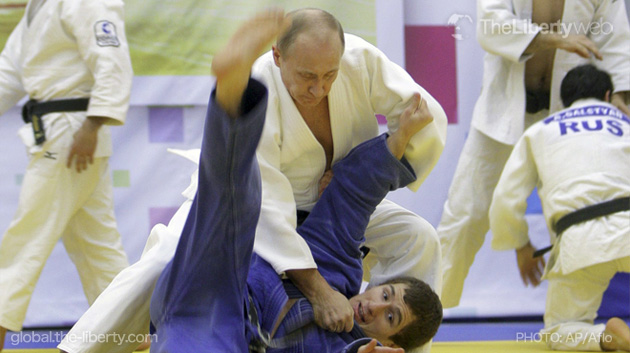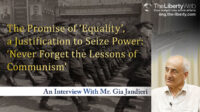President Putin and the Future of Russia
─An Interview with the Guardian Spirit of Vladimir Putin─
President Putin is highly regarded for his performance. He revived a “strong Russia,” by managing to subdue the economic and political turmoil, and by increasing the GDP growth by five times during his previous presidential term that continued for 8 years. It is highly likely that President Putin will continue to reign for the next two terms – a total of 12 years – until 2024. What will this empire be like? How does Putin regard Xi Jinping who is seen to become the next president of China, and how closely will he work with China? How will this country create the relationships with the U.S. and Japan? To know the answers to these questions and plan strategies, Ryuho Okawa, founder and president of Happy Science, invited the guardian spirit of President to the the General Headquarters of Happy Science in Tokyo on March 6, 2012. [See the note below]
[Note]These spiritual messages were channeled through Ryuho Okawa. However, please note that because of his high level of enlightenment, his way of receiving spiritual messages is fundamentally different from other psychic mediums who undergo trances and are completely taken over by the spirits they are channeling.
Each human soul is made up of six soul siblings, one of whom acts as the guardian spirit of the person living on earth. People living on earth are connected to their guardian spirits at the innermost subconscious level. They are a part of people’s very souls, and therefore, exact reflections of their thoughts and philosophies.
However, please note that these spiritual messages are opinions of the individual spirits and may contradict the ideas or teachings of the Happy Science Group.Read more on this>>
The following are the excerpts of Interviews with Guardian Spirits of Vladimir Putin.
<Master Ryuho Okawa’s Introduction>
A Lot Depends on Russia’s Future Actions
Ryuho Okawa[Hereafter referred to as “Okawa”]The results of the Russian presidential election have been announced, and Putin has been reelected. Japan should not overlook the importance of Russia when developing its national and foreign strategy.Japan is already making strategic decisions concerning China with due consideration of the U.S., but Russia must also be taken into account. We do not know how China and the U.S. will act as this depends largely on Russia.Recently, a U.N. resolution calling for Syrian President Assad to stand down was vetoed by permanent council members Russia and China, thereby stopping military intervention by U.N. forces. On CNN today, I saw the former Republican candidate John McCain call for air strikes against Syria. In essence, the question is whether the Cold War logic will continue to affect world issues.
If China pursues hegemony in Asia or engages in military expansion as we believe, Japan needs to forge strong diplomatic ties with Russia and India in addition to its good relations with the U.S. in order to counter China. But relations between the U.S. and Russia could sour if a strong Russia is resurrected under Putin’s rule. If the U.S. was as strong as it used to be, it could easily take on both Russia and China at the same time, but today, China alone is enough to make Americans nervous. Therefore, a lot of things are liable to change, depending on how Russia acts. Afraid to lose Siberia and Sakhalin to China, Russia is developing its own strategy to counter China’s expansionist ambitions.
Some think Russia will be at risk unless it maintains friendly relations with Japan. At the same time Russia is averse to being swallowed up by the West. It is a touchy issue for them. Russia does not want the West to see it as an enemy and build missile shields against it. Therefore it is trying to take a position in which it can placate both sides. One thing is clear – Russia plays an extremely significant role in world politics today.
Is Former KGB Agent Putin the “Dark Emperor”?
Putin is widely known to be pro-Japanese. He once stated that he used to be a rowdy youth, but was able to reform his life by learning discipline through judo. Being a judo expert is an interesting aspect of his personality. Also, while the former Soviet Union embraced an atheistic, materialistic philosophy, Putin is known as a devout Russian Orthodox Christian and has done a lot to revive the church in Russia.
But this is not the end of the story. After graduating from the Law Department of Leningrad State University, he joined the KGB and played spy games for some time so I am sure he is familiar with a few shady tricks.
Under Yeltsin, he became prime minister, and subsequently rose to the presidency. After serving two terms – a total of 8 years – he stepped down and became prime minister since the Constitution barred him from a third consecutive term as president. During his four year term as head of Internal Affairs he implemented new legislation that allowed presidents to rule for a consecutive period of 6 years, then ran for president again and won.
If he serves another two terms, his reign will be longer than two decades – surpassing Brezhnev as the longest serving Russian president. We are yet to see whether Putin is really a good man or a dark emperor who does not take democracy seriously.
I Want Russia to Stay Proud
――This is your third term as president. One thing you’ve always talked about is a “strong Russia”. Could you elaborate on that? What is this strength based on, and what is it needed for? Could you describe your image of a strong Russia?
Putin’s G.S. It seems like we are talking about a long time ago here, but back in the 1980s the world was divided between the Soviets and the U.S. fighting for world supremacy. That was how the Soviet people saw themselves.
But then, in a flash, old ‘Gorby’ (Gorbachev) dismantled it all. You have no idea how hard it was to fix his mistakes. Only Yeltsin’s scowling face could hold the country together. There were independence movements everywhere. It was unbearable to see a country being torn into pieces like that.
People were aware that regional independence would weaken the country as a whole, but they wanted freedom. People lived in a precarious situation, and saw many civil wars.
Back then, it was difficult to decide whether it was better to maintain a tight grip or to let go. But letting go would have meant that the individual member countries of the former Soviet Union wouldn’t have been able to do anything on their own.
Without maintaining friendly relations with the Soviet Union, many of them wouldn’t even have been able to connect geographically with other countries. Lots of these new states are landlocked. It’s very difficult to steer this ship. Right now, many pieces of the former Soviet Union are still loosely tied together, but we have yet to see what happens next – will those ties become stronger? Will we will drift further apart and separate into smaller countries? Or will we end up going back to the way we were in the past?
China’s rapid rise is a challenge for us, too, that could end up destroying us. It would be easy for China to help the independence movements in some of our unstable areas and use this to wrest away chunks of our territory. Although we may not be able to go back to the way we were, at the very least, I want Russia to remain proud.
Putin’s G.S. If I wanted to, I could make Russia as strong as it once was, but my political life is not long enough to return Russia to its former glory. However, even if I cannot bring it back to that level, I need to secure that my country moves in the right direction and ensure a good future for Russia.
The people of Russia need a strong leader. They are used to having a powerful leader, so if they are told to make their own decisions, they are at a complete loss. If Russians are given too much freedom, they will probably start a bloody struggle over their various interests.
Related
- Kan Ito's Column on Foreign Policy
Putin adopts a balance of power policy, which was often taken by major powers during the 17th-19th century.
-----Prime Minister Medvedev visited the four northern islands again, maintaining that it was Russian territory and he would not give an inch to Japan.
It is appropriate to analyze this issue looking at the big picture. There is no point debating the minor point of whether it is Medvedev or Putin that is anti-Japan….
- Words to Remember for Life
Tolstoy’s spiritual message on August 24th, 2012



















